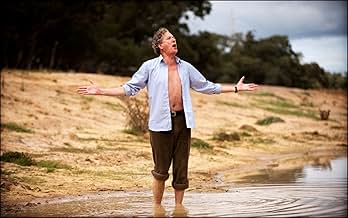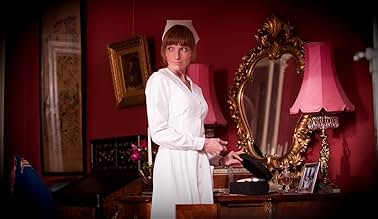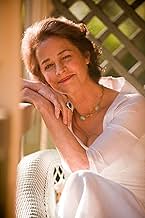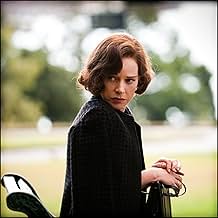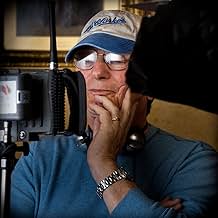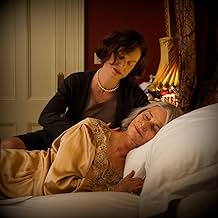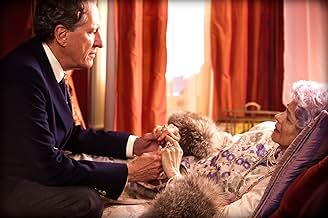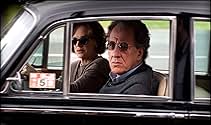Ajouter une intrigue dans votre langueElizabeth Hunter controls all in her life - society, her staff, her children; but the once great beauty will now determine her most defiant act as she chooses her time to die.Elizabeth Hunter controls all in her life - society, her staff, her children; but the once great beauty will now determine her most defiant act as she chooses her time to die.Elizabeth Hunter controls all in her life - society, her staff, her children; but the once great beauty will now determine her most defiant act as she chooses her time to die.
- Réalisation
- Scénario
- Casting principal
- Récompenses
- 8 victoires et 26 nominations au total
Avis à la une
The story is adapted by Judy Morris from the Nobel Prize winning novel by Patrick White (1912 -1990), an Australian author who is widely regarded as one of the most important English-language novelists of the 20th century. White's fiction employs humor, florid prose, shifting narrative vantage points and a stream of consciousness technique. In 1973, he was awarded the Nobel Prize in Literature, the only Australian to have been awarded the prize. 'The Eye of the Storm' is the ninth published novel by Patrick White and it is regarded as one of his best novels.
The elderly Elizabeth Hunter (Charlotte Rampling), widow of a wealthy grazier, is nearing the end of her days in some splendor in her mansion in Sydney, Australia, and her two children have been summoned to her bedside. Her son Basil (Geoffrey Rush), once a leading actor on the London stage whose career is now in decline and her daughter Dorothy (Judy Davis), the ex-wife of a minor French aristocrat whose fractured marriage has ended with her only asset being the retention of her title of Princess, are motivated more by their possible inheritance than affection for the old lady. In fact Elizabeth inspires more affection in her nurses (Alexandra Schepisi, Maria Theodorakis), her solicitor (John Gaden) and her tragic cabaret- entertaining housekeeper (Helen Morse) than she does in her children. Dorothy in particular has cause to hate her mother for secrets not immediately revealed ('Dorothy was breathless with resentment for what she herself could no more than half-remember, had perhaps only half discovered - on the banks of the ocean'), yet it is she who gets closer to her mother as the film progresses. Elizabeth is a shrewishly controlling woman and her descent into dementia only reminds everyone involved with her of the damaged childhood, marriage and life she has led. The manner in which the story come sot an end is somewhat surprising and in many ways rewards the viewer for the attention it takes.
The film is laid out in flashback scenes to manage the histories of all involved and the interior monologues that slowly build the full images of each f the characters and their inherent flaws. The acting is excellent, the cinematography is gorgeous, and the story is fascinating. If it doesn't exactly match the density of the novel by White then the ones who seem to be responsible of that are the director Fred Schepisi and the screenwriter Judy Morris. It is a tough story and if the viewer can maintain the level of concentration the film demands, then this is a most satisfying experience.
Grady Harp
"Storm" has all the features we have come to expect from "quality" Australian film-making - a great cast, polished direction, impeccable production values etc etc ... but it's as dull and disconnected as the world White writes about. Who really gives a stuff about an imploding grazing family presided over by a a dying monster ... nominally set in the 1970s, but really (as in most of White's writing) set in the 1930s?
On a $15m budget ... it probably needs a world wide gross of $100m to break even. Ye Gods - who green-lit this? How much Government funding went into it? (Its $1.6m domestic gross should just about pay for the Prints and Advertising" budget & little more).
We have a bustling new generation - make that two generations - of film-makers pushing the envelope and making "Animal Kingdom", "Daybreakers", "Red Dog" etc who seem to be at least aware of their audience and their responsibility for getting a return for their investors. Film-making is an expensive business ... and "Storm" is just a sad old melodrama, outdated, over-priced and isolated from the real world, doomed to fail financially. I can understand why audiences congratulate themselves for having sat through it ("splendid and intelligent" - another IMDb post), but it's just an Anglo middle class statement from people who are longing for the days of "Careful He Might Hear You" or "The Devil's Playground".
At least the English Class in those old portables only lasted 50 minutes...
No, I won't be reading this novel. What we see here is a great motion picture. We've become accustomed to Australian films depicting poverty, isolation, and mayhem. This has an air of opulence and connectedness.
Old Mrs Elizabeth Hunter, widow of a wealthy grazier, is nearing the end of her days in some splendour in her Centennial Park, Sydney, mansion, and her two children have been summoned to her bedside. Her son Basil, once a leading actor on the London stage whose career is now in decline and her daughter Dorothy, the ex-wife of a minor French aristocrat, are motivated more by their possible inheritance than affection for the old lady. In fact Elizabeth inspires more affection in her nurses, solicitor and housekeeper than she does in her children. Dorothy in particular has cause to hate her mother, yet it is she who gets closer to her as the film progresses.
Schepisi manages to blend in the dark humour of the situation with the downbeat storyline. The cinemaphotograhy is gorgeous and the cutting, often without the usual establishment shots, wonderfully done, given the extensive use made of flashbacks – you instantly realise where the characters are. The book's interior monologues often appear as a single image in a single screen. The casting is such as Geoffrey Rush mentioned at the preview that he could not refuse – the very best of the Australian acting profession, though the pivotal role of Elizabeth Hunter is played with great panache by Charlotte Rampling. Rush plays Basil as a man who takes himself seriously, but can't persuade anyone else to. Judy Davis simmers as the disillusioned Dorothy , and John Gaden as Wyburd the family solicitor with a skeleton or to in his own cupboard is pitch perfect. Flora the day nurse, played by Schepsi's daughter Alexandra, is vividly realised, and there are good performances in minor roles also, including Helen Morse, unrecognisable, as Lotte the tragic housekeeper, and Colin Friels as a Labor politician on the make rather reminiscent of one Robert James Lee Hawke. The only odd casting decision is casting Melbourne locations as Sydney. Mrs Hunter's mansion is definitely not in Sydney and only a couple of brief scenes are shot in Centennial Park.
It has been opined that "The Eye of the Storm" is Patrick White in drag, and it is true that there are some obvious personal aspects to the story - there is a lot of White's mother in Mrs Hunter. Set as it is in the early 1970s in the declining old money grazier milieu, this film could be written off as a period piece. Yet Schepisi has managed to capture both the theme and atmosphere of the novel. The difficulties of dying have rarely been so well depicted on film. This may not be a box office smash, but it will appeal to anyone who likes a solid piece of film-making.
Le saviez-vous
- AnecdotesIn real life Charlotte Rampling is only five years older than her screen son Geoffrey Rush and only nine years older than her daughter Judy Davis.
- Citations
[first lines]
Basil Hunter: [voice-over] If it were writ upon a page, it could revolve around this day, the day my mother came to believe that being of a certain class entitles you die whenever you damn well please. Don't we wish...
- ConnexionsFeatured in Q+A with Geoffrey Rush and Fred Schepisi (2012)
Meilleurs choix
- How long is The Eye of the Storm?Alimenté par Alexa
Détails
- Date de sortie
- Pays d’origine
- Sites officiels
- Langues
- Aussi connu sous le nom de
- The Eye of the Storm
- Lieux de tournage
- Société de production
- Voir plus de crédits d'entreprise sur IMDbPro
Box-office
- Budget
- 15 000 000 $AU (estimé)
- Montant brut aux États-Unis et au Canada
- 83 566 $US
- Week-end de sortie aux États-Unis et au Canada
- 25 785 $US
- 9 sept. 2012
- Montant brut mondial
- 2 104 689 $US
- Durée1 heure 54 minutes
- Couleur
- Mixage
Contribuer à cette page








